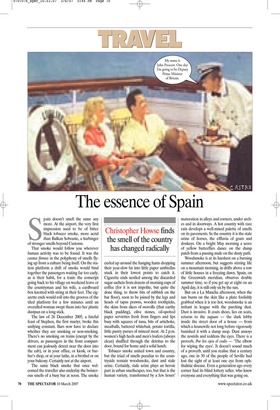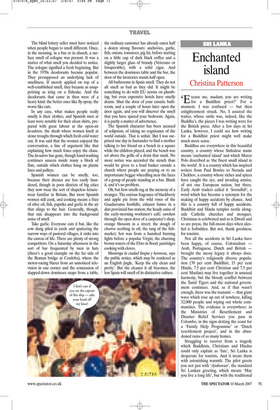The essence of Spain
Christopher Howse finds the smell of the country has changed radically
Spain doesn’t smell the same any more. At the airport, the very first impression used to be of bitter black tobacco smoke, more acrid than Balkan Sobranie, a harbinger of stronger smells beyond Customs.
That smoke would follow you wherever human activity was to be found. It was the cantus firmus in the polyphony of smells flying up from a culture being itself. On the station platform a drift of smoke would bind together the passengers waiting far too early, as is their habit, for a train: the conscript going back to his village on weekend leave or the countryman and his wife, a cardboard box knotted with string at their feet. The cigarette ends would roll into the grooves of the tiled platform for a few minutes until an overalled woman swept them into her plastic dustpan on a long stick.
The law of 26 December 2005, a fateful feast of Stephen, the first martyr, broke this unifying constant. Bars now have to declare whether they are smoking or non-smoking. There’s no smoking on trains (except by the drivers, as passengers in the front compartment can jealously detect near the door into the cab), or in your office, or kiosk, or barber’s shop, or at your lathe, in a brothel or on your balcony. Certainly not at the airport.
The same black smoke that once welcomed the traveller also underlay the boisterous smells of a busy bar at noon. The smoke curled up around the hanging hams dropping their year-slow fat into little paper umbrellas stuck in their lowest points to catch it. Cigarette ends nestled among the discarded sugar sachets from dozens of morning cups of coffee (for it is not impolite, but quite the done thing, to throw bits of rubbish on the bar floor), soon to be joined by the legs and heads of tapas prawns, wooden toothpicks, the skins from slices of morcilla (that earthy black pudding), olive stones, oil-spotted paper serviettes fresh from fingers and lips busy with squares of tuna, bits of artichoke, meatballs, battered whitebait, potato tortilla, little pastry purses of minced meat. At 2 p.m. women’s high heels and men’s loafers (always clean) shuffled through the detritus to the door, bound for home and a solid lunch.
Tobacco smoke united town and country, but the triad of smells peculiar to the countryside remain woodsmoke, dust and stale urine. Certainly, stale urine plays an heroic part in urban smellscapes, too, but that is the human variety, transformed by a few hours’ maturation in alleys and corners, under arches and in doorways. A hot country with rare rain develops a well-mixed palette of smells on its pavements. In the country it is the stale urine of horses, the effluvia of goats and donkeys. On a bright May morning a score of yellow butterflies dance on the damp patch from a passing mule on the dusty path.
Woodsmoke is at its harshest on a burning summer afternoon, but suggests stirring life on a mountain morning, in drifts above a row of little houses in a freezing dawn. Spain, on the Greenwich meridian, observes double summer time, so if you get up at eight on an April day, it is still only six by the sun.
But on a La Mancha afternoon, when the sun burns on the skin like a plate foolishly grabbed when it is too hot, woodsmoke is an irritant in league with the parching dust. Dust is invasive. It coats shoes, lies on seats, returns to the zaguan — the dark lobby inside the street door of a house — from which a housewife not long before vigorously banished it with a damp mop. Dust annoys the nostrils and reddens the eyes. There is a proverb, Por los ojos el codo — ‘The elbow for wiping the eyes’. It doesn’t sound much of a proverb, until you realise that a century ago, one in 30 of the people of Seville had lost the sight of at least one eye from ophthalmic disease. Even a generation ago every corner had its blind lottery seller, who knew everyone and everything that was going on. The blind lottery seller must have noticed when people began to smell different. Once, in the morning, in a bus or in church, a surface smell of cologne was present. It was a matter of what smell you decided to notice. The cologne signified a fresh beginning. But in the 1970s deodorants became popular. They presupposed an underlying lack of smelliness. If merely applied on top of a well-established smell, they became as unappetising as icing on a fishcake. And the deodorants that came in then were of a heavy kind: the better ones like fly-spray, the worse like cats.
In any case, what makes people really smelly is their clothes, and Spanish men at least were notable for their clean shirts, prepared with great labour at the open-air lavaderos, the sheds where women knelt at stone troughs through which fresh cold water ran. It was said that the women enjoyed the conversation, a line of argument like that explaining how much foxes enjoy the chase. The lavadero has gone, though hand-washing continues unseen inside many a block of flats, outside which clothes hang on plastic lines and pulleys.
Spanish women can be smelly, too, because their dresses are less easily laundered, though in poor districts of big cities they now wear the sort of shapeless leisurewear familiar in Britain. But most Spanish women still cook, and cooking means a frizz of olive oil, fish, paprika and garlic in the air that clings to the hair. Generally, though, that mix disappears into the background noise of smell.
Take garlic. Everyone eats it but, like the cow dung piled in yards and spattering the narrow ways of pastoral villages, it sinks into the canvas of life. There are plenty of strong competitors. On a Saturday afternoon in the sort of bar frequented by men in hats (there’s a good example on the far side of the Roman bridge at Cordoba), where the motor-racing blares from an unnoticed television in one corner and the concussion of slapped-down dominoes snaps from a table, the ordinary customer has already eaten half a dozen strong flavours: anchovies, garlic, fish, onions, tomatoes, pig fat, before starting on a little cup of dark black coffee and a slightly larger glass of brandy (Veterano or Insuperable), with a solid cigar. And between the dominoes table and the bar, the door of the lavatories stands half open.
All bathrooms in Spain smell. They do not all smell as bad as they did. It might be something to do with EU norms on plumbing, but even expensive hotels have smelly drains. Shut the door of your ensuite bathroom, and a couple of hours later open the door again, and you will discover the smell that you have spared your bedroom. Again, it is partly a matter of advertence.
The Spanish character has been accused of solipsism, of taking no cognisance of the world outside. That is unfair. But I was surprised one day in Santander to find a mother talking to her friend on a bench in a square while the children played, and the bench was set above the grille of a drain that stank. No more notice was accorded the stench than would be given to a loud busker outside a church where people are praying or to an importunate beggar wheedling near the faces of a group of people standing at a bar. Blank it, and it’s no problem.
Oh, but how smells tug at the memory of a stranger. The curious fragrance of blackberry and apple pie from the wild roses of the Guadarrama foothills; exhaust fumes in a dim provincial bus station; the heady anise of the early-morning workmen’s café; sawdust through the open door of a carpenter’s shop; orange blossom in a street; the dough of churros seething in oil; the tang of the fishmarket; hot wax from a hundred burning lights before a popular Virgin; the churning brown waters of the Ebro in flood; partridges cooking with cloves.
Mantenga la ciudad limpia y hermosa, says the public notice, which may be rendered as an English jingle, ‘Keep the city clean and pretty’. But the cleaner it all becomes, the less Spain will smell of its distinctive culture.



























































































 Previous page
Previous page